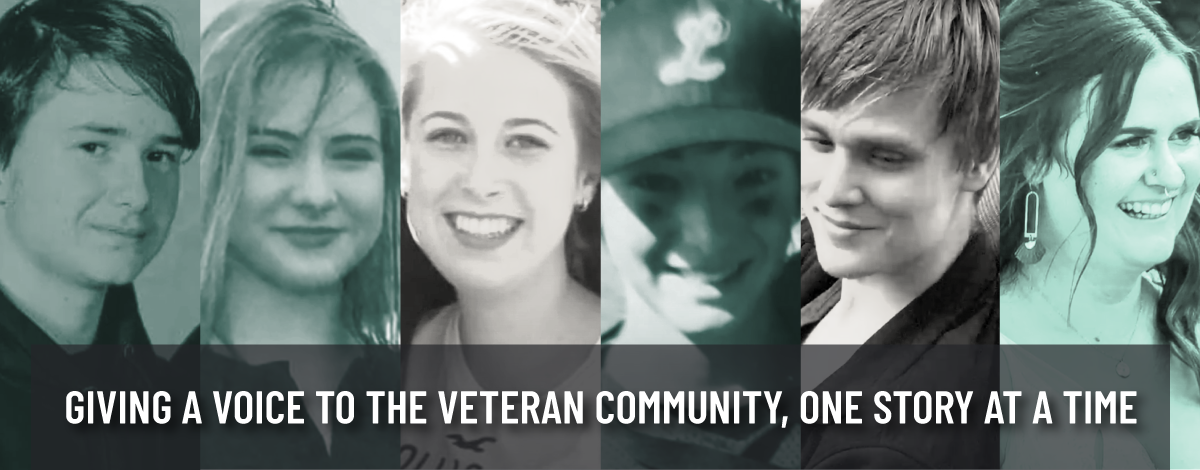
Having a Family member who has served in the Canadian Armed Forces (CAF) or Royal Canadian Mounted Police (RCMP) is often a source of pride for the children of Veterans. At the same time, Families can be a tremendous support to those who have served, especially if they are living with a post-traumatic stress injury (PTSI).
If you are supporting a Veteran with a PTSI, you are not alone. The Atlas Institute would like to invite you to explore a new series of short films by young people talking about what it’s like to have a Veteran with a PTSI in the Family, and their journeys towards healing and hope.
Join us on April 25, 2023 for this special virtual screening featuring young Veteran Family members telling their own stories.
This event will include a panel discussion with several of the Veteran Family members featured in the short films.
Be one of the first few people to watch these powerful real-life stories and take part in an important conversation about the impacts of PTSI.
We don’t often hear about Veterans in the news.
When we do, the coverage sometimes includes misconceptions and language that promote stereotypes about Veterans, especially those living with posttraumatic stress.
In an effort to support the work of journalists who are reporting on the Veteran experience, the Atlas Institute for Veterans and Families (formerly the Centre of Excellence on PTSD) and Dr. Rob Whitley of McGill University collaborated on a series of new guidelines. These are intended to assist journalists in using accurate and sensitive language when reporting on events involving or affecting Veterans, and to contribute to a new and more complex understanding of the lives of Veterans and of the Families who stand with them.
This live webinar was hosted by the Centre of Excellence on PTSD on Wednesday, October 27, 2021, 1–2:30 p.m. Eastern time. The conversation focuses on the new guidelines, as well as the anticipated benefits and outcomes for both journalists and Veterans.
This event has ended. More information and resources are available below.
Content warning
This webinar may include content on difficult topics including suicide. The content may be hard to listen to and may bring up a range of emotions. We encourage you to care for your safety and well-being.
Media guidelines for reporting on Veterans, with a focus on PTSD and suicide
Words Matter: Guidelines for Journalists When Reporting on Veterans Post-Event Summary
Media coverage of Lionel Desmond: Application of Mindset guidelines
Speakers & Presentations
Read more about the speakers and view or download their presentations from this webinar. Note: Not all speakers have downloadable presentations available.
Gavin Adamson is an associate professor at the School of Journalism at Ryerson University.
He has taught in every year of both the undergraduate and graduate programs with a focus on digital news. Gavin is the Velma Rogers Research Co-Chair at the school and his interests lie at the intersection of news media and information about mental health and illness. His research has focused on how the news is shared and read in social media, and how the news affects the audience.
Gavin is the co-winner of the 2020 Google News Initiative Innovation Challenge focused on diversity in the news.
Laryssa Lamrock is the Strategic Advisor for Families at the Centre of Excellence on PTSD.
She has a unique blend of experiences in nursing and military family deployment support. In addition, she has extensive knowledge and expertise in the field of peer support as well as lived experience as the spouse of a Veteran living with PTSD. She is also the daughter and mother of military members.
Laryssa draws from these experiences as she advocates passionately for, and represents the voices of, military and Veteran family members. Her path has opened many different opportunities as a representative of Veteran Families. She has served on a number of committees, including her current tenure on the MacDonald Franklin OSI Research Advisory Council. Laryssa co-authored the article “Coping as a Spouse of a Military Veteran with PTSD during the COVID 19 Pandemic” published in the Journal of Military, Veteran and Family Health in 2020.
Rob Whitley is an Associate Professor in the Department of Psychiatry, McGill University, and a Research Scientist at the Douglas Research Centre. He is also an Honorary Principal Fellow at the University of Melbourne, and has held honorary appointments at King’s College London, Dartmouth Medical School and Howard University.
Rob has published over 150 academic papers related to social and cultural psychiatry, and he is the author of a forthcoming book, Men’s Issues and Men’s Mental Health, published by Springer. Rob is also an experienced filmmaker, and is currently finalizing a short documentary about cannabis use among Canadian Veterans.
Walter Callaghan is a Veteran of the Canadian Armed Forces and a PTSD survivor.
In addition to being the Vice-Chair of the Research Reference Group at the Centre of Excellence on PTSD, he is currently working towards the completion of a PhD in medical anthropology at the University of Toronto focused on how Veterans make meaning of their experiences, especially moral injuries.
He has extensive experience working with news media, having been called on to help the public understand psychological distress as experienced by Veterans and current serving members of the CAF, as well as helping make sense of the psychological aftermath of tragic events like the Danforth shooting and the Yonge St. van attack.
He is currently teaching an advanced undergraduate seminar at the University of Toronto entitled “Media representations and social imaginations of mental illness.”
Jennifer Finestone is a bilingual facilitator, registered psychotherapist, and drama therapist in private practice in the Ottawa-Gatineau area.
She has worked extensively in the field of oncology and bereavement, and also focuses on transition and self-esteem. Jennifer believes in the value of using humour and creativity in her sessions with groups and individuals. She received a master’s degree in Drama Therapy at Concordia University. She also holds an Honours Psychology degree from McGill, as well as a certificate in Adult Training and Development from OISE (U of T), and a diploma in Theatre Arts from George Brown.
In November 2020, Atlas hosted a virtual discussion on the impact of the representation of Veterans in the media. ‘The Power of the Media: Impact on Veteran Stories’ was the first Atlas ‘Compelling Conversation’–a public discussion about issues affecting the health and well-being of Canadian Veterans.
Attendees heard the lived experiences and perspectives of a Veteran, Veteran Family Member and a journalist. The speakers shared stories that showed how their perspectives were presented in and shaped by the media.
Additional participants included Dr. Patrick Smith, former CEO and first President of Atlas, and Dr. Rob Whitley, Associate Professor of Psychiatry at McGill University and Research Scientist, Douglas Research Centre. The virtual panel was moderated by Graham Richardson, Chief News Anchor for CTV News at Six and afternoon news anchor on Newstalk 580 CFRA.
In partnership with



Tackling Harmful Stereotypes Can Promote Veterans’ Mental Health
An opinion piece, “Tackling Harmful Stereotypes Can Promote Veterans’ Mental Health,” encourages Canadians to see beyond Hollywood-inspired stereotypes of Veterans, and outlines a new research project aimed at helping journalists report about Veterans in a holistic and responsible manner, moving beyond any stereotypes to chronicle the diversity of Veterans’ experiences.
The editorial was co-authored by Dr. Rob Whitley, professor and research scientist with McGill University, and Brian McKenna, retired Warrant Officer and the Veterans Advisor for the Centre of Excellence on PTSD and Related Mental Health Conditions.